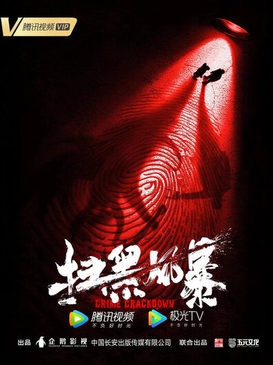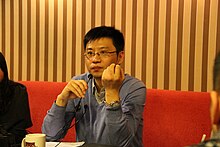The Lu Xun Literary Prize 鲁迅文学奖 is a literary prize awarded by China Writers Association. It is one of China's top four literary prizes and is named after Lu Xun and has been awarded every three years since 1995. Its predecessor, the National Outstanding Short Story Award and National Outstanding Novella Award, was established since the beginning of the new-era literature in the early 1980s.
Brantly Womack is Professor Emeritus of Foreign Affairs at the University of Virginia, where he has held the Cumming professorial chair, and Senior Faculty Fellow at the Miller Center, where he has held the CK Yen professorial chair. Most of his work has been on Chinese national and international politics.
The Politics of Hunan Province in the People's Republic of China is structured in a dual party-government system like all other governing institutions in mainland China.
Ding Shisun was a Chinese mathematician, academic administrator, and politician. He served as president of Peking University during the 1989 Tiananmen Square protests and massacre and was forced to resign afterwards. He later served as chairman of the China Democratic League from 1996 to 2005 and a vice chairperson of the Standing Committee of the National People's Congress.
Xu Qing, also known as Summer Xu, is a Chinese actress.

Liu Tienan is a former Chinese politician and senior economic official. He served as the Director of the National Energy Administration between 2011 and 2013, the deputy director of the National Development and Reform Commission (NDRC) from 2008 to 2011, and deputy director of the Revitalizing Old Industrial Bases in Northeast China Special Working Group between 2006 and 2008.
Yang Rong is a Chinese actress of Bai origin. She is best known for her roles in Cosmetology High and Memory Lost.

Counter-Japanese Military and Political University, also commonly known as Kàngdà (抗大) and Kangri Junzheng University (抗日军政大学), was a comprehensive public university located in Yan'an, Shaanxi, the headquarters of the Chinese Communist Party during the Second Sino-Japanese War. Its former site has been converted to a memorial hall.
Xu Geyang is a Chinese singer-songwriter. In July 2016, she made her debut as a contestant on the first season of the reality television singing competition show Sing! China on Zhejiang Television. She finished fourth in the finals. She released her first single, "Forever", in May 2017.

The Way We Were is a 2018 Chinese romance drama directed by Liu Jiang and starring Tiffany Tang and Luo Jin. The series airs on both Dragon Television and Beijing Television from 14 May 2018 to 10 June 2018. The series centers on the lives of Chinese overseas students in the United States.

Moonshine and Valentine, also known as The Love Knot: His Excellency's First Love, is a 2018 Chinese streaming television series based on the novel Jie Ai·Yihe Fenghuan by Shi Dingrou. The series was directed by Leste Chen, and stars Victoria Song and Huang Jingyu. It aired on Tencent Video from May 9, 2018 and ended on June 13, 2018.
Liu Xuyi was a Chinese historian, scholar, writer and expert on US studies.
Tsai Ying-wen was a Taiwanese political scientist and translator. He was a research fellow at Academia Sinica, with his main research focus on the history of Western political thought. His book, From Monarchy and Autocracy to Democracy, won Academia Sinica's 5th Academic Book Award in Humanities and Social Sciences in 2016.

Imperfect Love is a 2020 Chinese drama television series directed by Liu Bao and starring Zhou Xun, Kara Hui, Angie Chiu and Huang Jue. The series is a remake of the award-winning 2010 Japanese TV series Mother. It airs on Tencent Video and IQIYI from March 27 to April 4, 2020.

Crime Crackdown is a 2021 Chinese crime drama series written by Du Liang and directed by Wu Bai, and starring Sun Honglei, Lay Zhang and Liu Yijun. Based on several real-life cases that shook China in the 2010s, the series picks up a national anti-gang supervising group and local police officers as they take on gangs and the corrupt officials that offer these illegal groups a "protective umbrella". The series premiered on Dragon Television and Beijing TV on 9 August 2021.
Xu Liqun is a former Chinese politician who spent most of his career in northwest China's Ningxia Hui Autonomous Region. He was investigated by China's top anti-graft agency in November 2020. Previously he served as secretary-general of Standing Committee of the People's Congress of Ningxia Hui Autonomous Region.
Lydia He Liu is a theorist of media and translation and a scholar of comparative literature. She is the Wun Tsun Tam Professor in the Humanities at Columbia University.
Xu Rongkai is a Chinese politician who served as governor of Yunnan from 2001 to 2006. He was a member of the 16th Central Committee of the Chinese Communist Party. He was a delegate to the 11th National People's Congress and a member of the Standing Committee of the 10th National People's Congress.
Chu Yun-han was a Taiwanese political scholar, and an academician of the Academia Sinica.
Details of Democracy is a book by Chinese writer and political scientist Liu Yu. Originally published in 2009 as a collection of essays, the work explores the workings of American democracy to a Chinese audience.







